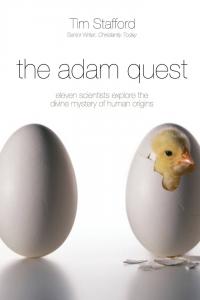 A few years ago Tim Stafford published a book, the adam quest, where he interviewed eleven scientists who have wrestled with the mystery of human origins. After a brief introduction into his reasons for Tim jumps into the interviews, allowing the scientists to tell there stories. The first three scientists are young earth creationists, followed by a couple of proponents of intelligent design, and finally several scientists who favor evolutionary creation.
A few years ago Tim Stafford published a book, the adam quest, where he interviewed eleven scientists who have wrestled with the mystery of human origins. After a brief introduction into his reasons for Tim jumps into the interviews, allowing the scientists to tell there stories. The first three scientists are young earth creationists, followed by a couple of proponents of intelligent design, and finally several scientists who favor evolutionary creation.
The three young earth creationists are Kurt Wise, with a Ph.D. in paleontology from Harvard, Todd Wood with a Ph.D. in biology from the University of Virginia, and Georgia Purdom with a Ph.D. in molecular genetics from The Ohio State University. There is a running theme in the views presented by all three of these scholars. They are all convinced that proper interpretation of the Bible begins with Genesis and requires a young earth. Christian theology of creation, fall, redemption, requires it. As a high school student Wise went to the Bible and cut out the parts he thought evolution would undermine – and it gutted the Bible … “when he lifted up the Bible, he had removed so much that the book fell apart in his hand.” (p. 14) Todd Wood “believes that the theological core of the Bible – creation, fall, redemption – hangs on a young earth creationist interpretation.” (p. 45) Georgia Purdom is convinced that the necessity of death in the evolutionary mechanism rules it out of the realm of truth for Christians. “Evolution portrayed millions of years of death, utterly detached from Scripture’s emphasis on death coming through human sin. “That’s clearly contradictory to Scripture, I knew that.”” (p. 56) In Purdom’s view this removes the responsibility for death from God and places it squarely on our shoulders. “God was not responsible, Death was not part of his plan.” (p. 57)
None of the three are quacks – and both Wise, who received his Ph.D. with Steven Jay Gould at Harvard, and Wood have become exasperated with creationist organizations that have continued to provide faulty information. Both Wood and Wise insist that science must be done properly with integrity. Wise, for example finds creationist apologetics something of a problem. Stafford writes:
After that, Wise lost interest in creationist apologetics, especially as he began to realize that many of the creationist evidences from his reading were wrong. “At first I thought it was ignorance.” As he learned more though, he became convinced that the mistakes in creationist literature were willful. … Wise concluded that for many creationists the end justifies the means. For them, “it doesn’t matter if what you say is true. It matters if it brings people to the right conclusion.” (p. 15-16)
Todd Wood is also quick to challenge poor arguments, believing that this is not the way forward. As Christians we should be seeking truth and telling lies will never get us to the truth.
Both Kurt Wise and Todd Wood have tried to establish a positive program to establish a framework that will work to integrate legitimate observations from the world around us with the young earth they believe must be God’s truth and plan. While he was on the faculty at Bryan College Kurt Wise brought together colleagues to “work together toward a grand universal theory (GUT) comparable to evolution in its scale and scope.” (p. 21) Wise has insisted “I am not an antievolutionist. I am a creationist. My life goal is to create a model that explains the world.” (quoted p. 21) Todd Wood has also burned some bridges in young earth circles by insisting that the evidence for evolution be treated with integrity. It does no good to claim that evolution is a theory in trouble when it isn’t. Instead the effort needs to go into looking for a better and comprehensive theory that works within the young earth framework.
Many of the creationists’ assertions missed the point, he realized, knocking down straw men. More fundamentally, science moved forward not by disproving theories but by advancing better ones. Creationism would win its argument when it demonstrated that it explained God’s creation better than an evolutionary model. (p. 38)
Wood worked toward that goal while at Bryan. He continues to work in this direction as you can see at Todd’s Blog.
Georgia Purdom has taken a different direction, working for Answers in Genesis and at the Creation Museum. Her focus appears to be on Christian apologetics. She is the resident expert in biology – although not an expert in evolutionary biology.
It is hard to fault Todd Wood or Kurt Wise. Convinced that Christian theology and reverence for the Holy Scriptures require a young earth, they are working in this direction. Georgia Purdom is equally sincere, but has focused on popular apologetics is a fashion that has left some Christian biologists unimpressed (eg. this post at Naturalis Historia on Purdom’s discussion of natural selection).
I have not met a bona fide scientist who holds to a young earth on scientific grounds. It always starts with Scripture and theology.
What insights do these view bring to the church?
If they are right, what approach should we take?
If they are wrong, i.e. Christian theology does not require a young earth, what approach should we take?
If you wish to contact me directly, you may do so at rjs4mail[at]att.net
If interested you can subscribe to a full text feed of my posts at Musings on Science and Theology.















